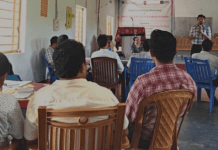As per a 2020 report by the Omidyar Network, the K-12 ed-tech-addressable market in India is projected to be worth $1.7 billion (USD) by 2022, up more than six-fold from $265 million in 2019. The report points out that ed-tech is poised to disrupt the status quo of the education delivery landscape. From another angle, the COVID-19 pandemic caused its own disruption to the ed-tech sector by compelling schools to deliver their content online.
Ed-tech initiatives are the e-avatar of tuition centres and coaching classes of the past. But they’re not just old wine in a new bottle. As opposed to formal education institutions, ed-tech solutions deliver several benefits, ranging from improved access to educational content, to tailored curriculum, to greater institutional autonomy. Their potential to positively impact education and improve employability is promising.
However, a lack of dedicated regulations makes the ed-tech market susceptible to abuse and deficient services, ultimately impacting a child’s learning. Questioning seemingly unfeasible promises become relevant in the backdrop of defamation cases filed by WhiteHat Jr. against two of its vocal critics [1]. Both had voiced concerns over allegedly fictitious advertisements by WhiteHat Jr. which claimed that children as young as six years of age could learn how to code, while teens could increase their earning potential to unfathomable levels through the use of its services. The Advertising Standard Council of India also asked WhiteHat Jr. to take down five advertisements for violating the advertising code for being misleading and unsubstantiated.

In addition to this, there are concerns about the data privacy and safety of children using ed-tech. Multiple vulnerabilities in the online storage of personal data of WhiteHat Jr.’s 2.8 lakh students and teachers was exposed by an anonymous cybersecurity researcher late last year. Although the vulnerabilities have now been reportedly fixed, the incident points towards the reality of weak data security protocols followed by corporates who often have access to sensitive data pertaining to children.
It is clear that the pragmatism of ed-tech’s solutions is not balanced by a legal framework that will allow it to flourish ensuring maximum advantage for its core beneficiary—the student. A “goldilocks” regulation of the ed-tech sector, that balances welfare with profitability, could address these issues.
What explains ed-tech’s rising growth?
In India, ed-tech has pervaded the after-school tutoring segment to supplant school education, competitive examination preparation, as well as other skills-based/extra-curricular education. Parents prefer these services to supplant their children’s formal education with marketable, career-oriented skills—be it technical skills like coding or computer programming, abstract analytical skills, or life skills like personal financial planning. Schools and non-governmental initiatives are also utilizing ed-tech services to reach children during pandemic-induced school closures and, generally, for a blended learning experience.
During the pandemic, DIKSHA—the central government’s free ed-tech platform—increased its user base tremendously. However, limited by its scale of operation, complex interface and frequent technical failures, it fails to be on par with other private platforms. Moreover, the centralised private control over DIKSHA’s design and functionality has adversely affected the potential for creative use of the application. Private players, thus, have managed to maintain consumer confidence and preference as opposed to their public counterpart.
You May Also Like: DIKSHA: The Long-Awaited Antidote to India’s Education Crisis?
Setting the pandemic aside, the need for children to supplant their formal education through informal means is proof of the deficiencies that exist in the education system. While there is no denying that the government needs to step up to ensure effective learning in public and private schools, it is also responsible for ensuring a safe and beneficial environment for those children who choose private tuitions online, often while paying substantial amounts for the same.
The Existing Legal Framework for Ed-Tech
There have been several efforts by the Centre and States to regulate private teaching institutions. A few states—such as Goa [2] and Karnataka in 2001, Uttar Pradesh in 2002, and Bihar in 2010—have brought private tutoring institutes within the purview of state control. However, despite being rooted in students’ welfare, these regulations have substantially failed in practice and purpose and private tutorials largely remain uncontrolled. More Bills are in the pipeline—for instance, the Private Coaching Centre Regulatory Code Bill (introduced in the Lok Sabha in 2016) intends to regulate licenses granted to operate coaching centres, maximum fees, conditions of functioning, and the facilities of coaching institutions throughout the country. Similarly, at the state level, draft bills—like the Maharashtra Private Coaching Regulation Act, 2018—have tried to regulate the system.
Moreover, ed-tech companies aren’t just offering ‘traditional’ coaching services. They have surpassed the “coaching centre” model and created new paradigms of learning—from pedagogical, curricular and even geographical standpoints. This is beyond the charter and framework of existing legislation, and so, will need to be progressively addressed. The Consumer Protection Rules, 2020 under the Consumer Protection Act, 2019 now covers e-commerce initiatives, goods and services bought or sold over digital or electronic networks. This would bring the likes of WhiteHat Jr., Aakash Digital, Superprof, and the plethora of similar B2C ed-tech enterprises within the scope and applicability of consumer protection laws in India.

Under the new law, e-commerce providers are expected to (1) notify a nodal officer, (2) provide for a grievance redressal mechanism, and (3) share accurate product/service information. Implementation of these practices is expected to improve accountability in the standard of services provided by ed-tech companies.
However, although a law that favours the customer, the Consumer Protection Act is hinged on the principle of caveat emptor—or, let the buyer beware—which shifts the burden of ensuring awareness about the product/service upon the consumer. This presents a paradox for the consumer, especially when combined with factors such as flamboyant advertisements and celebrity endorsements.
Regulating Online Education Providers – the Goldilocks Conundrum
The regulation of the education sector is a balancing act, with a want of innovation and development on the one hand, and commercialization on the other. There’s also the need to promote institutional autonomy while maintaining basic control and widespread access to students on the other. However, in no circumstance in these policy trade-offs can the welfare of children be sidetracked. As of now, several risks to children are associated with online education and tuitions.
Firstly, the storage of personal information generally comes at a higher risk to young children and students. The data which is shared through with online sites often include home addresses, bank account details for billing purposes, personal phone numbers, and IP addresses—data which can be used to identify and locate children. Children, especially those younger than 13 years of age, may not comprehend the nature and gravity of risks involved with disclosing information online, or accepting consent forms which may pop up during their use of online services. While the Personal Data Protection Bill, 2019 does comprehensively cover the protection of personal and sensitive data, special rules may be needed to ensure that the heightened risk involved with teaching young students is accounted for, particularly since minors (under the age of 18) cannot provide valid consent.
You May Also Like: Amidst COVID-19, Who is Watching Over Children’s Data on Ed-Tech Platforms?
Secondly, private ownership and profit-driven models make ed-tech companies prone to poor quality curriculum and teaching. The regulation in place for teacher qualifications and training in schools would not apply to such online education providers, which may lead to poor or fluctuating quality of teaching despite the high cost. Standing testament are the numerous videos uploaded by parents dissatisfied with WhiteHat Jr.’s teachers, speaking directly to the unpreparedness or ignorance of teachers’ on the subject matter being taught. In a country that struggles to maintain a healthy student-teacher ratio, claims by ed-tech providers of exponentially adding to their teacher base are simply unfeasible, without compromising quality. Additionally, dubious and attractive false claims which exploit the desire of parents to provide children with a secure future may allow such providers to function with virtually no accountability.
6 Goldilocks Recommendations to Regulate the Ed-Tech Industry
This vacuum of accountability need not persist though: there do exist methods by which ed-tech companies can be held to higher standards of accountability.
- Looping Ed-Tech Services in the State Education Acts
State education acts have sections carved to allow the setting of rules for the establishment and functioning of new formal education institutions. While the same regulations cannot be imposed on private ed-tech service providers, amendments can be brought in these acts to capture ed-tech firms and allow for the state to make dedicated regulations and keep an oversight.
- Addressal by Consumer Protection Rules
Existing legislation can provide security against many of the risks arising from ed-tech services. For example, the Goa Coaching Classes (Regulation) Act, 2001 controls private tuitions in the state and, among other things, restricts advertisements which directly or indirectly rely on the quality of coaching and the exam results of students who attended them. Rules under the Consumer Protection Act, developed along the lines of the Goa Coaching Classes Act, can address this specific aspect of online coaching and teaching services.
- Bring Ed-tech Under the Attention of Data Privacy Laws
The Personal Data Protection Bill, 2019, which is to be presented in the upcoming budget session, considers children younger than 18 years of age to be minors. As per the Bill, consent to collect, process, and store data pertaining to minors must be taken from their parents or guardians. However, for internet activities and services which are heavily accessed by pre-teens, special regulation with heightened security is warranted—which can improve the security of ed-tech solutions.
- Modifications to POCSO, If Needed
Online learning relies heavily on visual presentations and may involve live video calls or conference calls involving children. This also applies to online classes conducted by schools and other activities involving videography—like games and social media—which are widely used by children. These activities expose children to the risk of sexual offences online. This risk can be addressed through special regulations under the Protection of Children from Sexual Offences Act, 2012.
Apart from focusing on online service providers, children can also be on the challenges of changing modes of education and possible risks involved during online activities. Similar to the ‘Education for a Connected World framework’ by the UK’s Council of Children Internet Safety, which aims at skilling children to feel safe and act responsibly while using the internet, NCERT and SCERTs can develop programs to ensure children’s online safety too.
- Ensuring Inclusive and Accessible Education through Incentive Schemes
Quality private online education is elusive to a large proportion of the students by virtue of class inequalities, technological incapabilities and physical/intellectual disabilities. A welfare measure in the education sector will not be unprecedented. The Right to Education Act, 2009 mandates a 25% reservation of seats in private unaided schools for children from economically weaker and disadvantaged backgrounds. A welfare-oriented state policy towards ed-tech companies can materialize in financial incentives such as tax waivers or scholar vouchers for students, and thus ensure equitable access to online education.
- Mandating Standards
Like consumer products adopt standards to signify quality, online courses can be controlled by meeting set standards based on learning outcomes, teaching quality, personalization tools, and students’ experiences. Doing this would only help ed-tech solutions evolve into true learning aids that fill learning gaps for children. Standards such as ISO 21001:2018 provide management system standards for educational organizations by dividing the process of service provision and monitoring at different checkpoints. Permission to operate can be made conditional on meeting basic markers in such checkpoints during service delivery.
Looking Ahead
The 2021 Budget laid out a 2X increase towards digital e-learning. With projections of an exponential rise in ed-tech services by 2022, the sector needs the attention of policymakers as well. The government must take considered measures to protect the interests of children and young adults. The regulation of online education providers can support governmental endeavors, such as that of greater vocational skill integration and teacher skill-development, without having to invest in the infrastructure necessary for it. However, the responsibility of the state does not end at regulating online education platforms. Driving quality and affordable offline and/or online teaching is a right emanating from the fundamental right to life and must be primarily realized by the government, particularly in the aftermath of the pandemic.
[1] Whitehat Education Technology Pvt. Ltd. v. Aniruddha Malpani, 2020 SCC OnLine Del 1616, 24-11-2020
[2] Goa Coaching Classes (Regulation) Act (2001), Act 27 of 2001.






It’s an interesting article..!! Thanks for sharing. Looks Useful. Keep Posting….
Visit Site: Real Estate Company in India - Commercial & Residential property for sale, Buy & Rent. Best Villas in hyderabad, houses for sale near me A99 Real Estate. Link: A99 real estate
Thank you for sharing your expertise and providing practical tips for optimizing content. I believe there is even more potential for you to delve into this topic further and continue producing insightful and valuable content. Keep up the great work!
“Visit Site: “”Welcome to Maithri Systems, your one-stop destination for top-notch laptops and desktops coupled with exceptional sales and services. At Maithri Systems, we take pride in offering a wide array of high-quality laptops and desktops, catering to various needs and preferences.
Our sales division boasts an extensive range of cutting-edge laptops and desktops from leading brands, ensuring that you find the perfect device to suit your requirements, whether it’s for work, gaming, design, or everyday use. We prioritize quality, reliability, and performance in all our products, ensuring that each system meets stringent standards before reaching your hands.”” Link:Computer Services near me”””
I like how the writer organized his thoughts in addition to he visual part.
I didn’t have any expectations concerning that title, but the more I was astonished. The author did a great job. I spent a few minutes reading and checking the facts. Everything is very clear and understandable. I like posts that fill in your knowledge gaps. This one is of the sort.
“””Dream Teach Provides Best Teaching and Learning resources of geography in UK. It provides info on a geographical environmental quiz, journals that are helpful for Primary & Secondary Schools Teachers and Students.””
To know more about DreamTeach
Visit: geography learning resources!
Wow , i learned something new here. i wish you will post more article just like this one
“Abacus Trainer provides the Best Abacus Online Classes for kids. Best platform for Vedic Math Online Training classes from certified teachers for 5 years children.
To know more about AbacusTrainer
Visit: abacus classes online!
“Abacus Trainer provides the Best Abacus Online Classes for kids. Best platform for Vedic Math Online Training classes from certified teachers for 5 years children.
To know more about AbacusTrainer
Visit: abacus classes online!
Sri Chaitanya College has come up with some innovative and world-class learning methodologies that would make the Indians rules the world. Their farsightedness, determination and leadership qualities have given India a World-Class education system.
Kalyan Jewellers, we https://bit.ly/315fWdt the importance of every
wow…amazing post
more detail about Online chess coaching
Online chess coaching
We’re a Web Design Agency Bali with over a decade of experience in building user friendly, secure websites that help strengthen your business.
Satya Puri Studio is Bali architects have worked on historically-inspired homes & villa around the world — including “Lux Villa in Bali; Sukh Sagar Haveli in Jodhpur, Rajasthan; Kahani Paradise in Gokarna. Their work shows inspiration across history and styles, tied together with the goal of enhancing life through good design.
Thank You for sharing such an informative article.
Great post! Thanks for sharing
Thank you for this article. I always read very interesting articles on your site. Do you think to lead instagram blog too? I red from here https://techmoran.com/2021/02/11/every-personal-finance-brand-should-be-on-instagram-why/ that it is very easy to get first followers today
Interesting case. Did you post the article only here? You should publish it on Facebook and gain followers with https://soclikes.com/ to they discuss this topic too.
IELTS with personal trainer
Kalyan Jewellers, we embrace the importance of every gold Our wedding collections are for every bride, from every part of India.